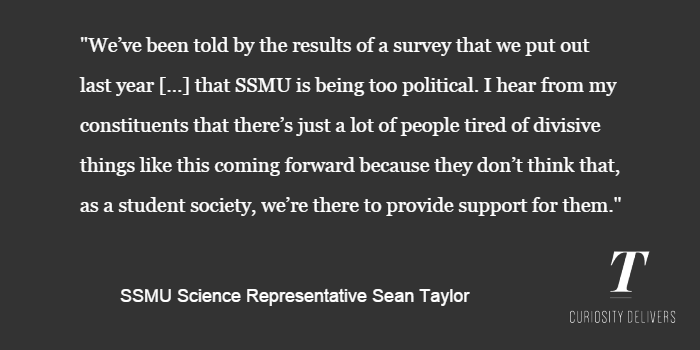Amendment regarding GA motions
The Students’ Society of McGill University (SSMU) Council approved a motion for the upcoming Winter referendum on a process to prevent motions deemed as ‘divisive’ or ‘external’ to SSMU’s mandate from being discussed at the General Assembly (GA). Under the proposed amendment, the GA Steering Committee—an unelected body composed of the SSMU president, vice-president (VP) (University Affairs), speaker of Council, four councillors and a thirdeExecutive member to be chosen by a vote of Council—would decide if the content of a potential GA motion should be debated and voted on by students, unless those present at the GA vote to overturn the decision with a two-thirds majority.
Science Representative Sean Taylor felt that adding this system would be a step towards easing tensions that emerged in light of the GA on Monday, February 21 which saw the approval of a motion in support of Boycott, Divestment, and Sanctions against Israel.
“We’ve been told by the results of a survey that we put out last year […] that SSMU is being too political,” Taylor said. “I hear from my constituents that there’s just a lot of people tired of divisive things like this coming forward because they don’t think that, as a student society, we’re there to provide support for them.”
SSMU VP External Emily Boytinck raised the concern that a screening process could limit the democratic nature of the GA.
“It is absolutely unacceptable that as a representative body—or even a potential non-representative body such as the steering committee—has the choice to determine what is divisive and what isn’t,” Boytinck said. “This is extremely problematic, not only for the culture of what we consider to be divisive, but also for who gets to have their voice heard on campus.”
Mental Health Fee
Council has approved for referendum a motion to create a new restricted fee to cover certain mental health services. Citing the need for urgent action in combatting mental illness on campus and the success of previously-established student efforts in this domain, the motion proposes a $0.40 opt-outable fee for all SSMU members, and would be used for general projects and hiring mental health staff.
While Clubs and Services Representative Francois-Paul Truc agreed with the necessity of these services, he expressed concern that it was a rehash of the recently-proposed SSMU fee increase that failed in special referendum.
“I’m very disturbed that this is a direct overlap with the referendum motion that failed previously, especially considering that this mental [health] fee will go towards paying staff, and one of the primary concerns that was echoed during the referendum was that people did not want more money going to staff,” Truc said.
Engineering Representative Malcolm McClintock spoke in support of the motion, citing the individuality of the fee as an asset.
“Seeing as the students didn’t directly oppose every individual motion that was packaged together into the referendum […] putting something forward that is smaller such as this is more beneficial in that students can actually pick and choose what they do and do not want rather than saying no to the large number that they saw during the referendum,” McClintock said.
This runs concurrent to the passing of a question for referendum to raise the opt-outable SSMU Health Plan fee by $25 to cover the addition of psychology services to the plan.
Leap Manifesto
Council voted to add SSMU to the list of signatories to the Leap Manifesto, a broad set of demands decided on by a cohort of “indigenous rights, social and food justice, environmental, faith-based, and labour movements,” according to the motion.
Boytinck, a co-mover of the motion, compared this motion to the recently passed SSMU Climate Change Policy.
“[I]t’s a little toned-down because it’s made by a lot of groups,” she said. “[Demands] are related to climate justice, indigenous rights, the just transition for workers against austerity cuts that severely damage the environment.”
Boytinck noted that the motion was largely symbolic, stating that signing the manifesto would be in solidarity with other McGill groups that have signed it, including Divest McGill and the McGill Office for Religious and Spiritual Life.
McClintock expressed concerns with the neutrality of the motion.
“Unfortunately, [the Engineering Undergraduate Society is] inclined to abstain with regards to the fact that this is more of a political statement that doesn’t represent the beliefs of the [enginering students],” McClintock said.
The motion passed with 16 in favour, one opposing, and six abstaining.
This article was corrected on March 2, the Tribune regrets any errors.









